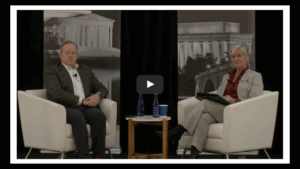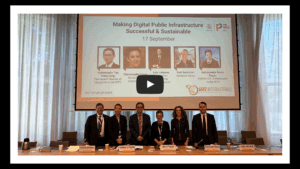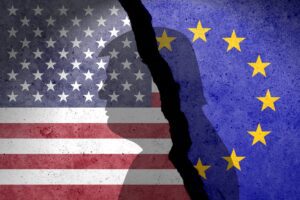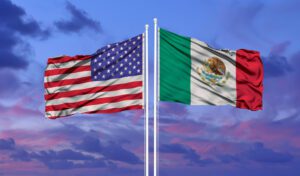The Art of the Deal: Trade Politics in 2025 with Sean Spicer
For this week’s Friday Exchange, we’re pulling one from the archives that many of you may have missed. On February 11, 2025, Sean Spicer, the former Press Secretary and Communications Director for President Donald Trump and onetime Spokesman for USTR spoke to the WITA membership about navigating trade politics in 2025. Sean’s message to WITA then still resonates today.
Featured Speakers:
Sean Spicer, Host of the Sean Spicer Show (YouTube and wherever you get your podcasts); former Press Secretary and Communications Director for President Donald J. Trump; former Communications Director of the Republican National Committee; former Spokesman, Office of the United States Trade Representative
Moderator: Nicole Bivens Collinson, Managing Principal, Operating Committee, International Trade & Government Relations Practice Leader, Sandler, Travis & Rosenberg, P.A.
Making Digital Public Infrastructure Successful & Sustainable – WITA Panel at the 2025 WTO Public Forum
On Wednesday, September 17, WITA hosted a panel at the WTO Public Forum in Geneva, Switzerland discussing how Digital Public Infrastructure (DPI) enables people to connect with one another to access a wide range of goods and services that are essential for economic development in the 21st Century.
Properly designed and managed, DPI can provide critical building blocks for the modern economy, to allow people to trade goods and services, expand opportunities for small businesses to participate in the formal financial system, send and receive money, and share information safely and securely.
Panelists discussed the role that the WTO can play in fostering robust governance frameworks and safeguards to secure access to technologies that can drive economic opportunity across social, economic, and geographic boundaries.
Featured Speakers:
Emmanuelle Ganne, Chief of Digital Trade and Frontier Technologies, World Trade Organization
Kyle Johnson, Senior Director of Trade Policy, The Information Technology Industry Council
Ambassador Tan Hung Seng, Singapore Ambassador and Permanent Representative to the WTO and WIPO, Permanent Mission of Singapore
Kati Suominen, Founder and CEO, Nextrade Group
Moderator: Ambassador María L. Pagán, former Deputy United States Trade Representative and US Ambassador to the WTO
Watch the Full Panel Here
09/17/2025 | WITA International
The EU-US Trade Deal, Mob Rule and the Way Forward: Who Holds the Real Trump Cards?
As we know, ‘tariff’ is the favourite word in the English language of the current US President – and the world is currently feeling and paying the price. During his first term, Mr. Trump started trade wars by imposing tariffs on inter alia the EU, Canada, Mexico and China. His second term commenced in the same fashion, with the imposition of tariffs on Canada, Mexico and China. The big shock followed on 2 April of 2025, when his administration imposed a 10% baseline tariff on almost all countries, and additional, individualised reciprocal tariffs on countries with which the United States runs a persistent trade deficit. In mid-July, Mr. Trump moreover threatened to impose a 30% tariff on imports from inter alia the EU, starting on the first of August.
A Doubtful Deal
Over the summer, the EU decided to bend the knee, rather than stand its ground and dare retaliate. Accordingly, Ms. Von der Leyen was happy to announce a comprehensive deal on 27 July, described in an earlier EU Law Live Op-Ed as a clever form of ‘appeasement on the back of empty promises’. On 28 August, the European Commission published a proposal to implement the EU-US deal. Article 1 of the document provides that the EU tariff on US goods will go down to 0%. In exchange, the US agreed to reduce its tariffs on EU goods from 27.5% to 15%.
While at first sight, the latter seems to be a (partial) win for the EU, the new rate in fact represents an increase compared to the pre-January 2025 tariffs. Journalists and economists have varying perceptions on the merits of the agreement. Some argue that, despite its welcome ambiguity, it is a bad deal if only for confirming the false narrative of the Trump administration relating to trade. Others argue that substantively, it is simply best the EU could get, and thus in true Godfather style, it resembled the offer that could not be refused.
While the classification in terms of ‘win or lose’ seems important at first sight, it matters less on second thought. The key issue remains that the EU-US deal is the result of economic coercion. It was reached through one actor putting the knife on the throat of the other. Hence, contrary to how diplomacy was understood until recently, we did not witness an outcome of genuine negotiations. Moreover, the Commission openly talked about it as a political agreement that is not legally binding. The EU therefore retains the ability to revoke and reverse any promise made without violating the principle of pacta sunt servanda. This holds even more since Bernd Lange, chair of the European Parliament’s international trade committee, admitted he is unsure he and his fellow law-makers are able to support the Commission’s venture.
Read the Full Op-Ed Here
09/15/2025 | Najibullah Zamani & Henri de Waele | EU Law Live
Trade Review Process Could Rock the Calm in US-Mexico Relations
One of the more surprising developments of President Trump’s tenure in office thus far has been the relatively calm U.S. relationship with Mexico, despite expectations that his longstanding views on trade, immigration, and narcotics would lead to a dramatic deterioration.
Of course, Mexico has not escaped the administration’s tariff onslaught and there have been occasional diplomatic setbacks, but the tenor of ties between Trump and President Claudia Sheinbaum has been less fraught than many had anticipated. However, that thaw could be tested soon by economic disagreements as negotiations open on a scheduled review of the U.S.-Mexico-Canada trade agreement (USMCA).
State of play
Both the U.S. and Mexico appear to have found a way to cooperate on the key bilateral security issues — like immigration and organized crime — allowing them to compartmentalize these subjects from negotiations over the future of the economic relationship. But the upcoming USMCA review could still be complicated by broader foreign policy questions about supply-chain security, American economic diplomacy in the hemisphere, and the tradeoffs involved in granting market access to the U.S.
When Secretary of State Marco Rubio visited Mexico last week, the U.S. attacked a boat in international waters that was allegedly transporting narcotics for a Venezuelan cartel. In his press conference, Rubio had warnings for Caracas, but was complimentary about his host country, noting that the U.S. has “had a great relationship with the Government of Mexico” adding that “it is the closest security cooperation we have ever had, maybe with any country but certainly in the history of U.S.-Mexico relations.”
The stabilization of ties is in good part a reflection of Sheinbaum’s success in balancing a steadfast insistence on her country’s sovereignty with her ability to deliver on key American demands — such as the extradition of more than 50 alleged drug traffickers to the U.S. in August.
Read the Full Analysis Here
09/15/2025 | Karthik Sankaran | Responsible Statecraft
America’s Quiet Turn Towards State Capitalism
Over the past few months, the administration has taken extraordinary steps to embed itself within the private sector. The government has acquired a ‘golden share’ in U.S. Steel as a condition for approving its acquisition by Japan’s Nippon Steel. Trump has struck a deal with Nvidia and Advanced Micro Devices, issuing export licenses in return for 15% of the companies’ China-related revenues from H20 chip sales. In July, the Pentagon purchased a 15% stake in MP Materials, a major rare-earth-mining firm, becoming its largest shareholder. Most recently, in August, the administration took a 10% equity stake in Intel, a chipmaker valued at US$8.9 billion, marking one of the most significant US-government interventions in a private company since the auto-industry bailouts implemented in the wake of the 2008 Great Financial Crisis.
These pay-to-play arrangements reflect the administration’s increasingly transactional approach to corporate America – an approach that challenges the foundations of the traditionally market-oriented US system. It blurs the line between regulatory oversight and commercial negotiation. The deals often rest on tenuous legal grounds, with little oversight or transparency. Yet few companies are willing to challenge the government. For many, these arrangements serve as political insurance – a way to ‘buy certainty’ in a volatile regulatory environment. For others, they are a defensive move to avoid more aggressive pressure or exclusion from government contracts. In effect, firms are paying to prevent worse outcomes. These quid-pro-quo deals are potential templates for broader application across strategic industries, with discussions under way about similar arrangements for defence contractors.
Shades of state capitalism
Two models of state intervention appear to be emerging. The first model, often framed as ‘patriotic capitalism’, treats companies or sectors as national champions and instruments of state power. Here, the American state behaves much like its Chinese counterpart, integrating firms into geopolitical strategies. For example, in August, Howard Lutnick, the secretary of commerce, called Lockheed Martin ‘an arm of the US government’, as the company is highly dependent on federal contracts. In its deal with MP Materials, the Pentagon will acquire rare-earth elements at guaranteed prices to establish an end-to-end supply chain of critical minerals in the US, very much mimicking China’s domestic tactics. Similarly, earlier this year, the US government announced plans to invest lavishly in the shipbuilding sector to counter China’s dominance in the industry. Unlike China’s reliance on massive subsidies, the Trump administration prefers to use regulatory leverage over strategic companies and empower government-backed institutions, such as the International Development Finance Corporation. For example, in the deal with MP Materials, the Department of Defense has secured US$1bn in private financing from JPMorgan Chase and Goldman Sachs to build a magnet-manufacturing facility in Texas.
Read the Full Analysis Here
09/15/2025 | Maria Shagina | The International Institute for Strategic Studies
WITA – We put the community in trade community.
Information about upcoming WITA and trade community events







